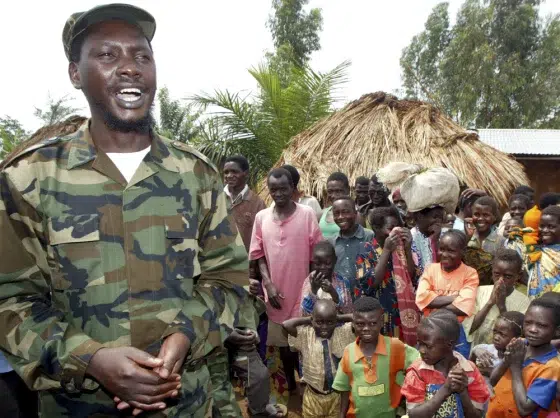Uganda-Based Convicted War Criminal Forms Rebel Group in Congo
New Rebel Movement in Ituri: A Growing Threat to Eastern Congo’s Stability
The security situation in eastern Congo’s Ituri province has taken a concerning turn as Thomas Lubanga, a convicted war criminal, announces the formation of a new rebel group. The group, Convention for the Popular Revolution (CPR), aims to challenge the government and further destabilize the region already plagued by conflict. This move comes at a time when Congo’s military is struggling to contain the Rwandan-backed M23 rebels in other parts of eastern Congo, raising alarms about a potential escalation of violence in the region.
Thomas Lubanga’s Controversial Past and His Return to Violence
Lubanga, a native of Ituri, first rose to global infamy when the International Criminal Court (ICC) convicted him in 2012 for his role in recruiting child soldiers during the brutal conflict in Ituri. He was sentenced to 14 years in prison but was released in 2020. Despite his past, Lubanga has found his way back into the spotlight. In 2022, he was kidnapped by a rebel group and held hostage for two months, an incident he attributes to the Congolese government’s failure to ensure his safety. Now based in Uganda, Lubanga has launched the CPR, which includes both political and military factions.
The Formation of CPR: A New Rebellion Threatens Ituri
Lubanga’s Convention for the Popular Revolution (CPR) is still in its early stages, but its formation already presents a grave threat to Ituri’s fragile peace. Lubanga has stated that the CPR has armed groups in three regions of Ituri, though they have yet to launch full-scale military operations. The group’s primary objective, according to Lubanga, is to push for a drastic change in governance to address what he views as systemic failures that have long plagued the region.
While it remains unclear how many fighters Lubanga controls, U.N. experts have linked him to the mobilization of local militias and the M23 rebels. The growing tension between various armed factions has compounded the region’s instability, and Lubanga’s return to the political and military stage only adds fuel to an already volatile situation.
Ituri’s Unprecedented Crisis: Thousands of Civilians Affected
The unrest in Ituri, where various armed groups have long been active, has caused untold suffering for the local population. Doctors Without Borders (MSF) recently reported a spike in violence, with more than 200 civilians killed and 100,000 displaced since the beginning of 2025. The region continues to be a battlefield for numerous militia groups, with Ugandan troops present to assist in fighting the Allied Democratic Forces (ADF) (ADF), an Islamist militant group responsible for numerous atrocities in the area.
The International Community’s Role and the Need for Peace
The ongoing violence in Ituri highlights the critical need for sustained international attention and intervention to bring about peace in the region. While efforts have been made to address the challenges posed by armed groups, including Uganda’s role in fighting the ADF, the emergence of Lubanga’s CPR suggests that the conflict is far from over. The international community must remain vigilant in its efforts to combat these violent groups, promote effective governance, and protect the civilian population.
What’s Next for Ituri?
As the CPR begins to make its presence felt in Ituri, the Congolese government faces mounting pressure to maintain control and stabilize the region. The situation remains fluid, and it is unclear how the government will respond to Lubanga’s new movement. For now, the people of Ituri are caught in the crossfire of multiple armed factions, with little hope for peace in the immediate future.
Call to Action:
The situation in Ituri province is dire, and urgent steps are needed to ensure peace and stability. Join the conversation on how the international community can support Congo in tackling armed militias and promoting a peaceful resolution to the ongoing conflict. Share this article and spread awareness about the importance of continued diplomatic and humanitarian efforts in the region.



